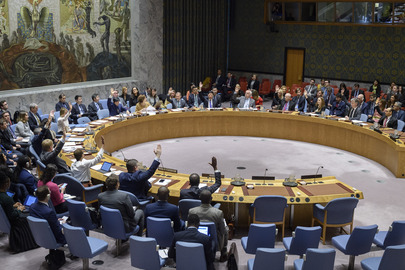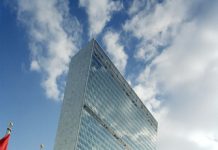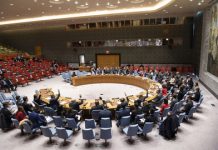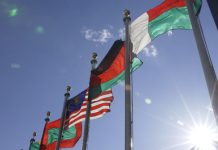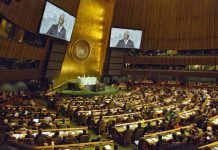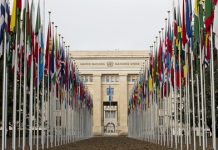Mr. Guterres was addressing ambassadors in the iconic chamber in New York on United Nations Day, marking 80 years since its founding. He spoke via video link from the capital of Viet Nam, Hanoi, during a robust open debate on how the UN navigates an uncertain future.
As the UN’s primary body for maintaining international peace and security, the council wields significant power, including the authority to impose sanctions and authorize military action.
Five of its 15 members have a permanent seat and were granted veto power under the UN Charter.
While the Council has played a central role in peacekeeping, conflict resolution and upholding international law, its veto system has often stalled action and sparked criticism.
The body’s structure is viewed by many countries and top officials as unrepresentative, leaving regions like Africa and Latin America without a permanent voice.
Invoking those who have looked to the council over 80 years to end wars, Mr. Guterres said that “the privilege to sit at this table carries a duty – above all – to honour the faith of those people,” he said. “Without a Security Council fit for purpose, the world is in grave danger.”
Debate over fundamentals
Presiding over the council for October, Russia praised the UN’s achievements but criticised the actions of Western governments, while elected (non-permanent) member Guyana, said the body was unrepresentative, advocating for greater and meaningful global representation.
The United States focused on operational reform, accountability, and called for a merit-based selection of the next Secretary-General – who takes the helm in January 2027 – emphasising the primacy of national sovereignty and transparency in the selection process.
The US representative called for an end to a selection process based on regions taking it in turns, arguing it was time to choose from a global roster of candidates.
Secretary-General António Guterres (on screen) addresses Security Council members.
A UN for the weak, not the powerful
The UN chief painted a vivid picture of how Council decisions can impact citizens worldwide:
“The Security Council is not about hegemons and empires. It is about parents who have lost their children, refugees flung far from their homes, soldiers who have sacrificed their limbs.
“In every shadow of this Chamber, you are surrounded by the ghosts of the dead. But beside them stands something else – the hopes of the living.”
He urged Council members to listen to those hopes.
“Listen closely and you will hear the cries of your citizens who rally for peace; the whispers of families who long for safety…The United Nations emblem does not bear the laurel wreath of a victor, but the olive crown of a peacemaker.”
But its legitimacy is fragile
Mr. Guterres highlighted the Council’s successes over eight decades, from helping Cambodia emerge from genocide to supporting South Africa’s transition from apartheid and deploying missions in Sierra Leone, Timor-Leste, and Liberia.
Yet its legitimacy remains fragile, he stressed, noting that violations of the UN Charter by some Member States erode trust and risk global stability.
He called for and expanded membership to better reflect the world’s demographics, including permanent representation for Africa, Latin America and the Caribbean.
Mr. Guterres also encouraged discussions on proposals to limit the use of the veto.
A wide view of the Security Council as Secretary-General António Guterres (on screen) addresses members.
Russia: Divisive Western powers
Russia’s Ambassador Vassily Nebenzia praised the UN’s achievements but cautioned against the actions of Western powers.
“In an effort to maintain its waning influence, the West divided the world into ‘us’ and ‘them’ – ‘democracies’ and ‘autocracies’ – a group of those who are chosen, and those who are violating their imposed order,” he said.
As a result, many of the UN Charter’s principles remain concepts, not a reality. “Adventures” – from the Iraq invasion and Colour Revolutions to the recent invasion of Iran – have only led to tragedy, he said.
Guyana: Reform now
Guyana’s Ambassador Carolyn Rodrigues-Birkett echoed calls for reform, describing the current configuration of the Council as unrepresentative.
“The Security Council must be reformed. Notwithstanding the expansive breadth of the work of the UN, the reality is that this success or failure of the United Nations as a whole is judged in large measure through the action, or lack thereof, of the Security Council,” she said.
She called for permanent seats for Africa and Latin America and a rotating seat for small island developing States, emphasising that national interest and international cooperation are complementary.
US: UN ‘has lost its way’
The United States, represented by Ambassador Dorothy Shea, focused on accountability. She said the UN had become a “bloated bureaucracy” that has lost its way, calling for mandates with clear political objectives and measurable benchmarks.
“The UN should serve Member States rather than have Member States beholden to an unaccountable bureaucracy,” she said.
On the next Secretary-General, Ambassador Shea said the US seeks a leader who will restore the UN to its founding purpose, respecting state sovereignty and prioritising accountability and transparency.
She added that the selection process should be merit-based, drawing candidates from all regional groupings, and that the next Secretary-General should “bring the UN back to basics and by so doing, help achieve the bold vision of peace and prosperity to which we all committed.”
A humble ballot box
A photograph of a UN Security Council meeting on atomic energy in 1947.
At the start of the meeting, the UN chief recalled a remarkable moment from the UN’s early days: the first Security Council ballot box in 1946. To everyone’s surprise, a slip of paper was already inside – a note from Paul Antonio, a local New York mechanic who had made the box.
“May I, who have had the privilege of fabricating this ballot box, cast the first vote? May God be with every member of the United Nations Organization, and through your noble efforts bring lasting peace to us all – all over the world,” Mr. Antonio wrote.
“Paul Antonio – the mechanic never sat at this table He never gave a speech or signed a treaty,” Mr. Guterres told ambassadors.
“But he believed in everyone here. He believed in you. I urge you: honour that trust. Make this chamber worthy of the hopes of every man, woman and child.”
Source of original article: United Nations (news.un.org). Photo credit: UN. The content of this article does not necessarily reflect the views or opinion of Global Diaspora News (www.globaldiasporanews.com).
To submit your press release: (https://www.globaldiasporanews.com/pr).
To advertise on Global Diaspora News: (www.globaldiasporanews.com/ads).
Sign up to Global Diaspora News newsletter (https://www.globaldiasporanews.com/newsletter/) to start receiving updates and opportunities directly in your email inbox for free.


